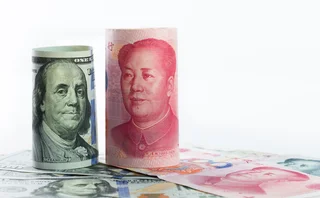
Baht appreciation to slow on central bank reforms
On July 23 the BOT said it would allow Thai state enterprises to freely hedge Thai foreign currency debts regardless of maturity. Previously they could hedge for up to one year. It also eased rules on holding foreign currency deposits. Exporters may now hold foreign currency deposits for six months -- up from three months previously.
The BOT will also allow institutional investors to invest in foreign debt securities up to a limit of US$500 million.
Usara Wilaipich, Thailand economist at Standard
Only users who have a paid subscription or are part of a corporate subscription are able to print or copy content.
To access these options, along with all other subscription benefits, please contact customer services - www.fx-markets.com/static/contact-us, or view our subscription options here: https://subscriptions.fx-markets.com/subscribe
You are currently unable to print this content. Please contact customer services - www.fx-markets.com/static/contact-us to find out more.
You are currently unable to copy this content. Please contact info@fx-markets.com to find out more.
Copyright Infopro Digital Limited. All rights reserved.
As outlined in our terms and conditions, https://www.infopro-digital.com/terms-and-conditions/subscriptions/ (point 2.4), printing is limited to a single copy.
If you would like to purchase additional rights please email info@fx-markets.com
Copyright Infopro Digital Limited. All rights reserved.
You may share this content using our article tools. As outlined in our terms and conditions, https://www.infopro-digital.com/terms-and-conditions/subscriptions/ (clause 2.4), an Authorised User may only make one copy of the materials for their own personal use. You must also comply with the restrictions in clause 2.5.
If you would like to purchase additional rights please email info@fx-markets.com
More on Economics
Central banks to stay dovish, but messaging is key
Paying attention to what central banks say is the way to anticipate their moves in 2018
European Union dissatisfaction remains a risk for markets
Economists question whether France and the EU have surmounted their eurosceptic hurdles
Macroeconomic impact of Trump presidency still questionable
Global markets reacted with euphoria in the wake of the US election, but real economy repercussions may be less positive
ANZ warns on RMB volatility
Global financial markets head urges caution
Markets are exaggerating FOMC dovishness, says Goodhart
Ex-MPC member warns delegates at the FX Week Europe conference
FX Week Europe: Disaster in the eurozone still plausible, warns Neil Record
Founder of Record Currency Management favours a new type of hedging product that protects investors from the exit of eurozone members
FX Week China: Asia not immune to euro crisis spillover, warns IMF
"Home-grown vulnerabilities" could be a threat to Asian countries, including China, says IMF official at FX Week China event
Greece will stay in the eurozone, says Deutsche’s FX strategy head
Alan Ruskin explains why a Greek exit is less likely than some have suggested, with several factors supporting the country’s future in the eurozone







